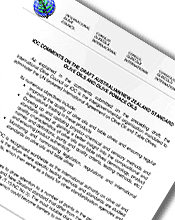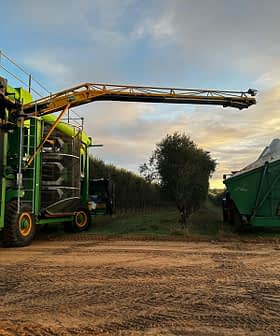The International Olive Council’s (IOC) recent response to the proposed Australian and New Zealand olive oil standards released in December has been met with marked skepticism by Australia’s olive oil heavyweights. The IOC recommended the guidelines be reconsidered, labeling them potential “barriers to international trade” that could actually “make it easier for adulteration”.
Its response is basically a very detailed list of all the ways that the draft of the Australian and New Zealand standard differs from the provisions of the IOC trade standard. There is little explanation of why the IOC’s limits are more appropriate or evidence to support its logic.

Olive oil expert Richard Gawel said the statement that the new chemical standard will be a barrier to trade is more rhetoric than fact. “The foreword to the standard states that any divergence from the IOC standards was based on solid data collected regarding the ranges in the natural chemistry of Australian olive oils,” Dr. Gawel said.
“What this has meant was that a couple of standards were relaxed. If anything this should make free trade easier. Common sense would dictate that free trade is restricted when standards are tightened not relaxed.” Gawel said it seems the IOC is more concerned about the proposed tests for DAGs and phyropheophytins.
“The latter in particular has the potential to stem the flow of old stored up EU oil which no doubt graces our shores on a regular basis,” Dr. Gawel said. “But that is what standards are about. Making sure that consumers get what they think they are paying for.”
On the other hand, Graham Aitken, of New Zealand olive oil importer William Aitken & Co., lashed out at statements that Australia and New Zealand do not believe that existing IOC rules adequately protect the region’s consumers and producers. He said that as someone very involved in the New Zealand olive oil market, he can affirm that this is not a commonly held view.
Last year, Australian consumer organization Choice published a survey that showed that many imported olive oils available in supermarkets were unreliable, with 50% of those tested failing to meet minimum label standards. One of these was Lupi Extra Virgin, New Zealand’s biggest selling brand, of which William Aitken & Co. is its New Zealand importer.
At the time Mr. Aitken said that New Zealand samples of the oil were often sent to independent European laboratories for testing, and “… invariably they come back certified as EVOO under IOC standards”.
Gawel said the draft standard is not only directed at imported oils, with Australian producers and importers likely to be just as affected. He said consumer research conducted in Australia shows that the strongest driving force to purchasing extra virgin olive oil is its perceived health benefits, with old oil not as healthy as fresh oil. He said the new standards may restrict the trade of old oil.
“The Australian industry is large enough for there to be residual oil from a previous season sitting in a tank somewhere. So the Europeans aren’t alone in this. Standards can only restrict trade if they are deliberately set so that one group can meet them and another necessarily can’t. I can’t see how this could be the case here.”
The standard’s drafting leader Leandro Ravetti said that while he was unable to comment while the draft standard was open for public comment, Standards Australia and the committee working on the olive oil standard take all matters, particularly any accusation involving technical barriers to trade, very seriously.

He also mentioned that the IOC comment is just one of hundreds of comments received so far.
Gawel also criticized the IOC for failing to provide data that support its rationales, such as how it sets campesterol limits. IOC’s response to the draft standard provides a table entry entitled “reference documents”, which provides a link to the home page of its own website, which does not list any reference documents on how their limits are set.
“What is important is why campesterol is set at 4 percent rather than 4.5 or 4.8 or even 2 percent,” Dr. Gawel said. “No one argues that campesterol is found in higher levels in seed oils than olive oil, so that very high campesterol levels in olive oils can be seen as a smoking gun for adulteration.
“However, by its nature, this sort of evidence is circumstantial. Different EVOOs vary naturally in this component and do so quite substantially. So the real question is exactly how much circumstantial evidence is required before it becomes a hangable offense?” He says the Australian standard has actually publically provided data to support its rationale.
“[IOC’s] claims of being ‘the premier world organization overseeing olive oil’ don’t go any way to supporting their case. Surely if they were confident of their case, they would be splashing the data around everywhere for all and sundry to see.”
Paul Miller, president of the Australian Olive Association, said while he hasn’t seen the IOC response as he is in Malaysia at the Codex Alimentarius Fats and Oils Committee in support of the Australian government delegation dealing with some olive oil matters, he is certain that the process of developing such a standard in Australia is a comprehensive and competent one.
“From what I have been told the IOC comments seem to be effectively critical of the process,” he said.

